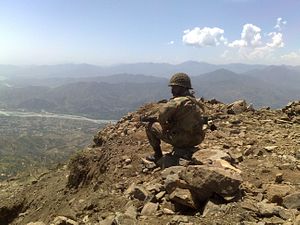Pakistan recently announced its defense budget for fiscal year (FY) 2014-2015, which will be 11 percent larger than last year’s defense budget. The total defense budget for the coming year will stand at $7 billion. According to Defense News, the bulk of the budget, $3.4 billion, will head to Pakistan’s Army, its largest and most regularly used branch military, and the remainder will go to the Air Force and the Navy with roughly a 2:1 ratio ($1.5 billion for the Air Force and $725 million for the Navy). Furthermore, the Inter-Services Organizations (including the Inter-Services Intelligence Directorate) and the Defense Production Establishment have been allocated $1.5 billion each. The defense budget accounts for 18 percent of Pakistan’s national budget at 2.36 percent of national GDP.
The budget increase comes as Pakistan faces an increasingly severe domestic threat from the Tehreek-e-Taliban Pakistan (TTP). The organization was temporarily in negotiations with the civilian government but has punctured any attempts at reconciliation with a sudden terrorist attack. Most recently, TTP-affiliated fighters attacked Karachi International Airport, killing scores. Pakistan’s military budgets have traditionally also been a function of the degree to which the country feels threatened by India. This latest budget was likely finalized after the results of the 2014 Indian general election became known and Narendra Modi and the right-wing Bharatiya Janata Party (BJP) came to power in India. While India’s right-wing politicians tend to be more hawkish on Pakistan in general, Modi’s election has actually resulted in a brief period of rapprochement between the two countries following Pakistani Prime Minister Nawaz Sharif’s trip to New Delhi for Modi’s inauguration.
The purpose of the defense budget increase is likely to compensate for growing operating costs for the Pakistan military. Additionally, Pakistan will likely ramp up domestic military manufacturing projects, including the JF-17 Thunder multi-role combat aircraft project (jointly undertaken with China). Experts remain skeptical that the budget increase is sufficient to allow the Pakistani military to engage in any new or serious procurements. Salma Malik, a Pakistani defense export cited by Defense News, states that the higher budget is merely a “smokescreen.” “If we look at the economic profile realistically, I doubt there is any definite improvement other than a cosmetic facelift for the economy; for defense outlays, there is a need for substantial outlays and reforms,” she adds.

































